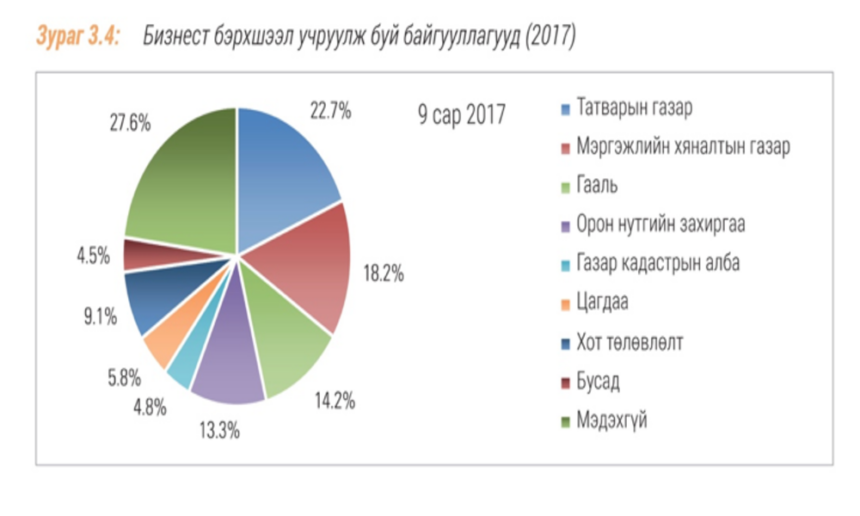Having started its drive 20 years ago to reach destination ‘free market’, our economy has now lost its direction in the mist of corruption that has grown as fast as air pollution in the city. At the same time, our economy is stuck in the mud of corruption, and every time we push our engine, we are sinking deeper and deeper.
Thick mist over business environment
Everyone talks about how corrupt our business environment is, but we need to have better knowledge of what type of corruption exists at what level and try measuring it. The Asia Foundation has conducted a survey on perceptions of corruption seven times since 2012, using methodologies meeting international standards. As part of the program to support governance and transparency in Mongolia, they did a survey in October 2017 to assess the impact of corruption on business environment. The survey had a sample size of 330 respondents, which was made up by 330 large-, medium-, and small-sized companies randomly selected for the questionnaire. In 2012, 50 per cent of the respondents said that they were dissatisfied with the general business environment in Mongolia, while this percentage grew every year to reach 60 per cent in 2017.

In 2012, 27.2 per cent of respondents said they were satisfied with the business environment, but this number was halved in 2016 to 12.1 per cent. It should be noted that all companies, regardless of their sizes, provided very similar responses, which reflects that there is a real need to improve the business environment.
When asked about obstacles in doing business, more than half of respondents said the taxes were too high. The other biggest obstacles included obtaining licences and permits (23 per cent), access to credit (21 per cent), and low level of professionalism (17 per cent).

When it came to organizations that created the biggest obstacles, customs was ranked first (27.6 per cent), followed by the tax office (22.7 per cent) and the Specialized Inspection Agency (18.2 per cent).

A concluding picture depicts the government whipping Mongolian businesses to get paid, having put all kinds of tax burdens on their backs. Small and medium businesses are resorting to corruption when the government procedures are too bureacrautic with a low level of professionalism and insufficient clarity on rules and regulations.
Another benefit of this series of surveys is that we can see various trends that have occurred for the last six years. In 2012-2017, there seems to have been no progress in reducing corruption in the public sector, but the situation, in fact, has worsened.

For example, the 2012 respondents saw 42.1 per cent of them saying that the public sector had a lot of corruption, but this percentage rose to 48.5 per cent in 2017. When it comes to people who said that there was some corruption in the public sector, the percentage decreased from 40 per cent to 35.8 per cent. However, if you combine these two, it can be seen that approximately 80 per cent of all respondents said there was some or a lot of corruption in government organizations, which proves that the situation has become alarmingly dire.
Getting out of the mud
This survey also shows that government activities intended to reduce corruption are bearing no fruit. In 2012, 19.4 per cent of respondents said that the steps taken by the government to eradicate corruption were totally ineffective, and this percentage increased to 41.8 per cent in 2017. Those who said they were hardly effective decreased from 39.1 to 29.7 per cent between 2012 and 2017. It shows that 70 per cent of respondents viewed that what the government is doing to eradicate corruption was not effective.
The key reasoning behind this perception is that corrupt government officials are not getting punished.
If the government is incapable of fighting corruption, the private sector can play its part. After all, corruption is something both parties commit. However, the survey showed that businesses are not doing anything about it, unfortunately.
When asked if the company took any steps to fight corruption, 71.5 of 2012 respondents answered ‘no’, while the percentage grew to 73 per cent in 2017.

In 2012, 74 per cent of respondents said that their business did not have any written policy or rule to combat fraud and corruption. This percentage grew to 81.2 per cent in 2017. The percentage of respondents who said they never reported a case of corruption grew from 81.8 to 90.6 per cent in 2012-2017.
If we nurtue a culture that says businesses cannot commit fraud or corruption, the whole situation will improve. Otherwise, when businesses are not fighting corruption and dealing with the root cause of this problem, they will also be losing their financial resources for corruption. This survey also revealed that businesses spend approximately 10 per cent of their budget on non-business related issues.
The Mongolian private sector now needs to decide whether they should continue wasting this much amount of money without creating any value.
It is said that it is better to light a candle than curse the darkness. The key to overcoming the darkness of corruption lies in the businesses. Once there is a spark, there will be light.
The origin of Mongolia’s corruption traces back to political party financing being kept secret. People have been demanding the Mongolian People’s Party and the Democratic Party to reveal the sources of their funding, but they have been playing deaf and dumb all the time.
Our economy can only leave the mud and achieve prosperity when corruption is stopped. It is up to the people and businesses whether we can bring that time closer.
2018.03.07
Trans. by B.Amar












